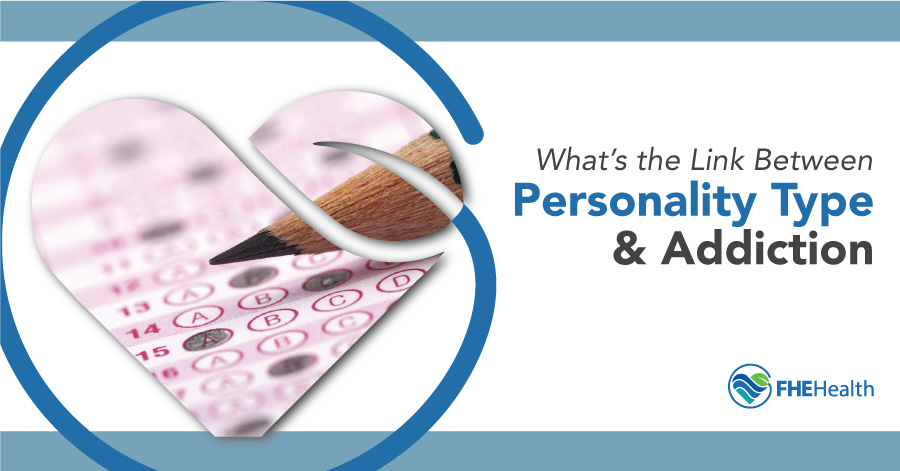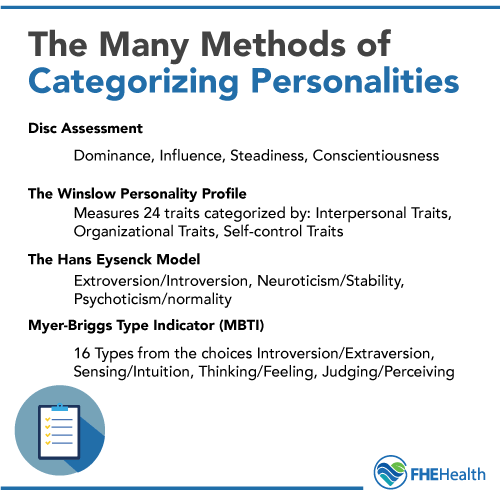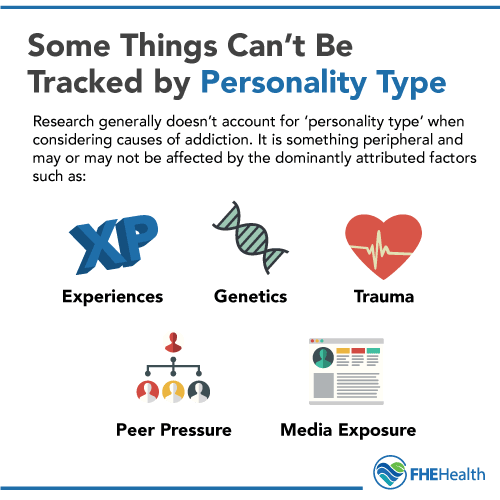
With more than 22 million Americans experiencing a substance abuse problem, it’s no wonder people worry if there are predisposing factors to addiction. Some studies show personality traits can make people more prone to addiction, but much of this information is conflicting.
According to Scientific American, there is no correlation between someone’s personality and whether or not they are prone to addiction. Despite this, several traits can be recognized in people who develop substance abuse, even though not every person with these traits becomes addicted.
Categorizing Personality Types
 So which personality traits are linked most often with addiction? Multiple tests exist to measure personality traits, including the Disc Assessment, the Winslow Personality Profile, the Hans Eysenck Model and the most popular Myer-Briggs Type Indicator (MBTI), which is based on Carl G. Jung’s theory of psychological types.
So which personality traits are linked most often with addiction? Multiple tests exist to measure personality traits, including the Disc Assessment, the Winslow Personality Profile, the Hans Eysenck Model and the most popular Myer-Briggs Type Indicator (MBTI), which is based on Carl G. Jung’s theory of psychological types.
In the 1950s, cardiologists Meter Friedman and Tay Rosenman described personality types based on a potential risk factor for heart disease. Type A personalities are outgoing, anxious and concerned with time management. Type B personalities have lower stress levels and Type C personalities are introverted and strong workers.
What Type Is More Prone to Addiction?
Typically, individuals with risky personalities or those on opposite ends of the personality spectrum have a greater tendency toward addictive behaviors. This includes those who constantly fail to see the positive aspects of a situation or those who experience negative feelings, including anxiety, depression and other mental health disorders.
Sensitive individuals also look to drugs for an escape from disappointment and sadness. Those who tend to be over-pleasing or over-forceful in situations are most likely to abuse drugs.
According to Live Science, researchers believe many factors lead an individual to abuse drugs, including personality traits, genetics, past drug use and their environment. Factors like media exposure, peer pressure, feeling lonely or bullied and constantly being around drugs and alcohol may predispose someone to addiction.
Lifestyles that May Lead to Addiction?
 While psychological factors may lead to addiction, you may have environmental influences or lifestyle influences that predispose you to addiction. According to Pyramid Healthcare, there are several external factors that increase your risk addiction, including peer pressure, your family environment and your gender. Research has shown that men are more prone to having issues with drugs or alcohol than women. This could be because men tend to start drinking or experimenting with illegal substances at a younger age than women because they are more likely to exposure through peers and family members than women.
While psychological factors may lead to addiction, you may have environmental influences or lifestyle influences that predispose you to addiction. According to Pyramid Healthcare, there are several external factors that increase your risk addiction, including peer pressure, your family environment and your gender. Research has shown that men are more prone to having issues with drugs or alcohol than women. This could be because men tend to start drinking or experimenting with illegal substances at a younger age than women because they are more likely to exposure through peers and family members than women.
Young people are at a greater risk for alcohol and drug abuse from their peers. Individuals with a difficult home life or those who are exposed to a parent who drinks or takes drugs are also at greater risk to copy the same behaviors. Finally, an individual who takes pain medications long term for a chronic injury is predisposed to addition once they develop a tolerance to the medication.
Extroverts vs. Introverts
Extroverts tend to have more positive thoughts while introverts tend to think negatively. Extroverts thrive in social situations and feel their best when in a crowd.
Introverts, on the other hand, get their energy from being alone. They prefer to focus their efforts on one task at a time and tend to observe situations before taking part.
The Myer-Briggs system categorizes these as extraverts and introverts. There are subtle differences, but it is a similar concept about where the person’s focus is. It’s not as immediately clear as you might expect, which personality is more prone to addiction.
Introverts may give in more to substance addiction in an effort to escape from reality and in an attempt to fit in with the crowd. When an introvert starts using drugs and alcohol, it may significantly improve their ability to deal with social situations. Extroverts or Extraverts, on the other hand may find themselves in situations where drug use is more common.
Sensing Types vs. Intuition Types
Sensing types rely on what can be detected through the five senses. They count on the facts and tend to resist possibilities.
Intuitive types focus on hopes and dreams and thrive on possibilities. Because they are more open-minded, they may be more apt to try new things. In some cases, this can lead to substance abuse.
Thinking Types vs. Feeling Types
Thinkers are extremely logical. They know exactly why they do what they do and can explain how they feel about issues. Feeling types act based on what they are feeling in the moment.
Thinkers are organized and plan their actions while feelers act on impulse. Individuals who base each choice on logic are less likely to give into peer pressure or try new things without considering the consequences first.
To a thinking person, knowledge is power. They are less likely to use drugs and alcohol recreationally without considering what could happen in the future.
Addiction often has to do with a lack of impulse control. People with intense focus may be more likely to control the impulses that lead to addiction.
Judging Types vs. Perceiving Types
Judging types, or those who are settled, decided and like to plan ahead make decisions quickly while perceiving types like to keep their options open. They don’t like deadlines and typically have a wait-and-see attitude. Studies have shown that both introverted judging and perceiving types are prone to negative feelings about themselves and more likely to suffer from addiction.
Hans Eysenck Type A vs. Type B
The Hans Eysenck Model categorizes individuals as Type A or Type B personalities. Type A people are competitive, outgoing, ambitious and impatient. Type B people are more relaxed, easy going and creative.
As far as addiction goes, Type B personalities are more impulsive and tend to have a stronger family history of alcohol abuse. On the other hand, Type A personalities are prone to stress and may use alcohol and drugs as a way to cope.
With so many conflicting studies on personality traits and the likelihood of addiction, it seems clear that an individual isn’t automatically predisposed to substance abuse simply due to their personality traits. Most experts agree that personality, environment, friends and genetics all combine together to play a role in developing a chemical dependency.
If you or someone you love needs help with addiction, contact FHE Health at (833) 596-3502. Our caring team members are available 24/7 to answer any questions you might have about treatment.






